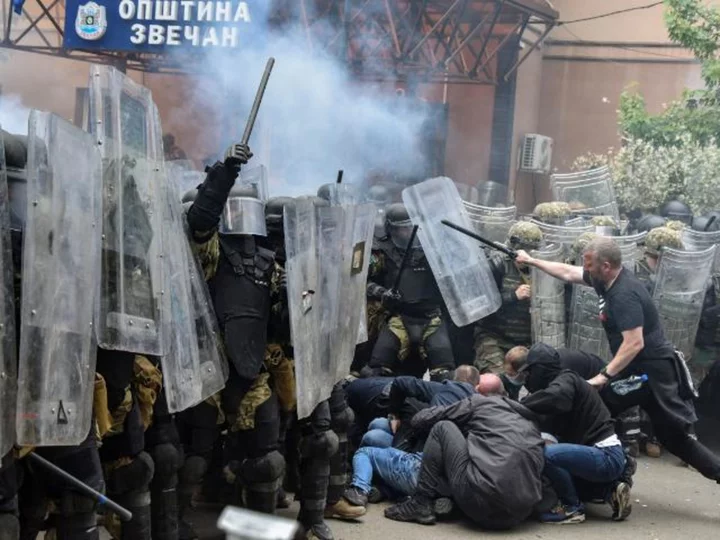At least 34 soldiers of NATO's peacekeeping mission in Kosovo were injured during clashes with protesters in the northern part of the country Monday, according to the Italian defense ministry.
Tensions have risen in the past week after ethnically Albanian mayors took office in northern Kosovo, a majority Kosovo Serb area, following April elections that Kosovo Serbs had boycotted.
NATO's Kosovo Force (KFOR) said the recent developments prompted them to increase their presence in northern Kosovo on Monday morning, which they later said turned violent.
The Italian defense ministry said 14 of its KFOR peacekeeping soldiers were injured when protesters threw "Molotov cocktails, with nails, firecrackers and stones inside."
Hungarian and Moldovan soldiers were also among the injured peacekeeping troops, according to the Italian defense ministry.
"Italian and Hungarian KFOR contingent were the subject of unprovoked attacks and sustained trauma wounds with fractures and burns due to the explosion of incendiary devices," it said, adding that KFOR medical units treated the soldiers.
Italy's Prime Minister Giorgia Meloni expressed her sympathy for the Italian KFOR soldiers injured in the clashes, adding in a statement, "What is happening is absolutely unacceptable and irresponsible. We will not tolerate further attacks on KFOR."
Meanwhile, Nemanja Starović, Serbian State Secretary in the Ministry of Defence, offered a different version of events than what was outlined by NATO countries. He said "many" protesters were injured in the clashes and accused KFOR of using flash grenades when the "peaceful" protesters had "decided to disperse and continue the protest tomorrow morning."
Kosovo, which is mainly ethnically Albanian, won independence from Serbia in 2008. But Serbia still considers Kosovo to be an integral part of its territory as do the Serbs living in northern Kosovo.
NATO has troops stationed in Kosovo to maintain peace, with tensions often flaring between Serbia and Kosovo.
Rising violence
The NATO-led multi-national contingents had been deployed to four municipalities in the region to contain "violent demonstrations" as "newly elected mayors in recent days tried to take office," KFOR said in a statement.
On Friday, Serbian President Aleksandar Vučić put the armed forces on the highest level of combat readiness. That decision followed Kosovo police clashing with protesters who tried to block a newly elected ethnic Albanian mayor from entering their office.
On Monday, barbed wire had been put around a municipal administration building in the municipality of Leposavić, with KFOR troops reported to be wearing anti-riot gear, CNN affiliate N1 reported. It added that Kosovo police special units erected a fence near the municipal administration building in the town of Zvecan.
Kosovo police say protesters had shown violence on Monday as they gathered in the municipalities of "Leposaviq, Zubin Potok and Zveqan." Police added that in front of a facility in Zvecan, protesters had thrown tear gas and "tried to cross the security cordons to enter into the municipality facility by force."
Serbian Prime Minister Ana Brnabić described KFOR's increased presence in northern Kosovo on Monday as "belated" and said "the task of this international mission was to protect the interests and peace of the people in Kosovo and Metohija, not the usurpers."
Brnabić said the situation in Kosovo and Metohija is "tense and difficult" and said, "It has never been more difficult." Brnabić also expressed her "gratitude to Serbs in the province for remaining calm and refraining from violence."
Meanwhile, the United States ambassador to Kosovo, Jeff Hovenier, condemned "violent actions" by protesters, citing the use of explosives.
The European Union Ambassador to Kosovo, Tomáš Szunyog, also condemned actions by protesters, citing damage to media vehicles.
Russia's Foreign Minister, Sergey Lavrov, also spoke about the situation on Monday, describing it as a "large eruption is brewing up in the center of Europe."
Correction: An earlier version of this story gave the wrong title for Nemanja Starović. He is the state secretary in Serbia's Ministry of Defence.

